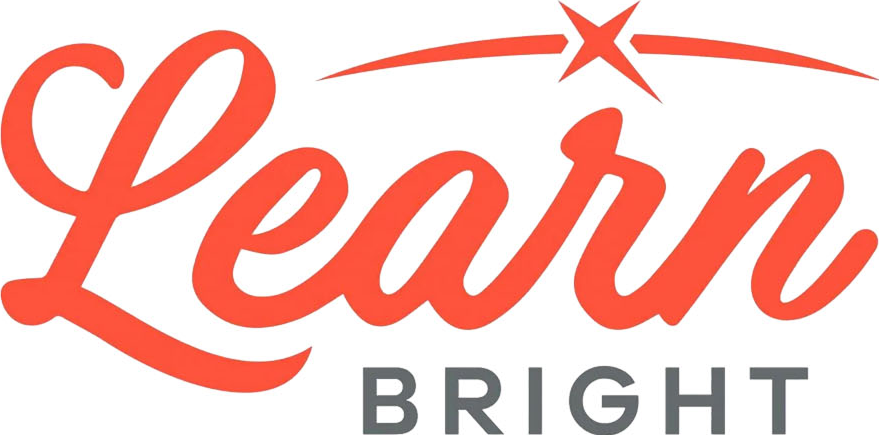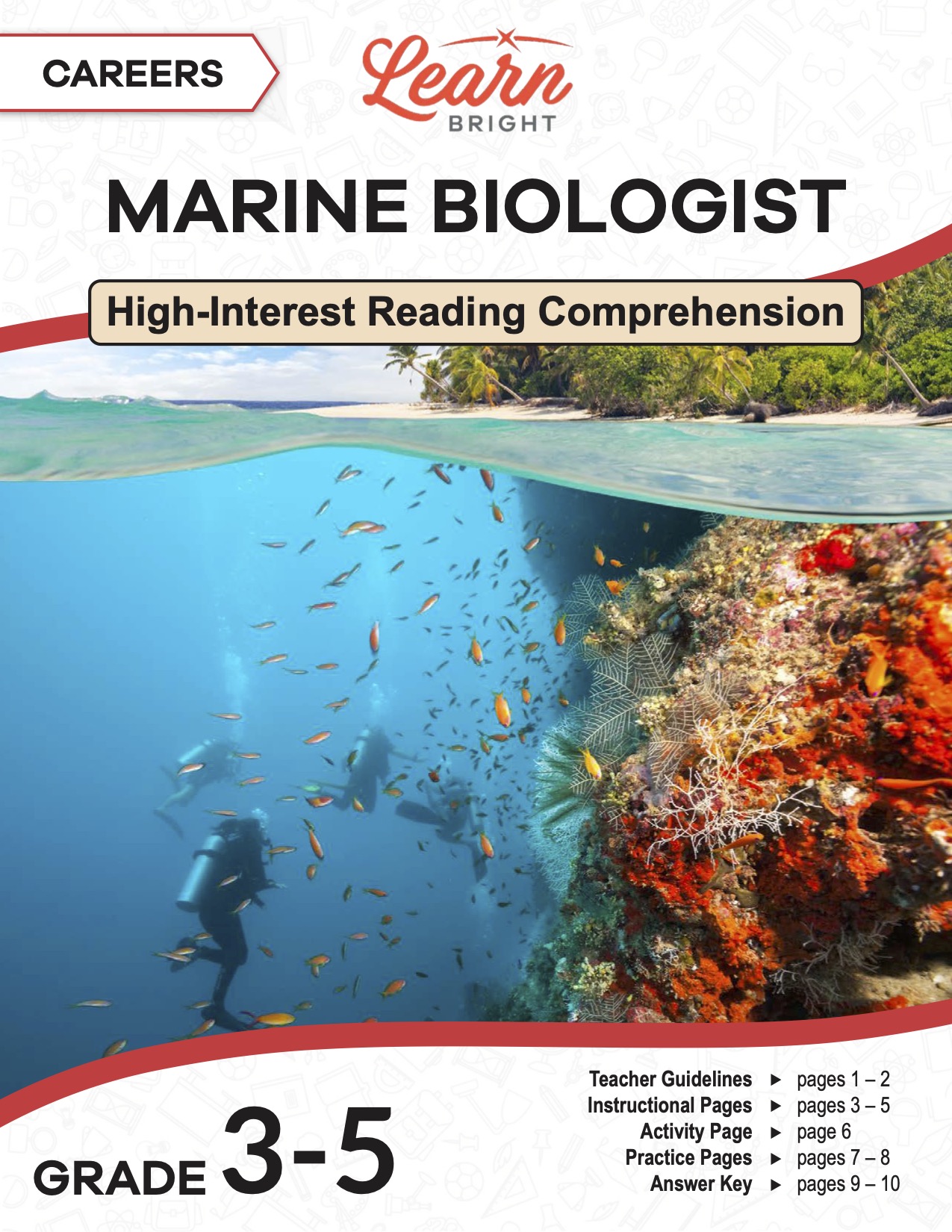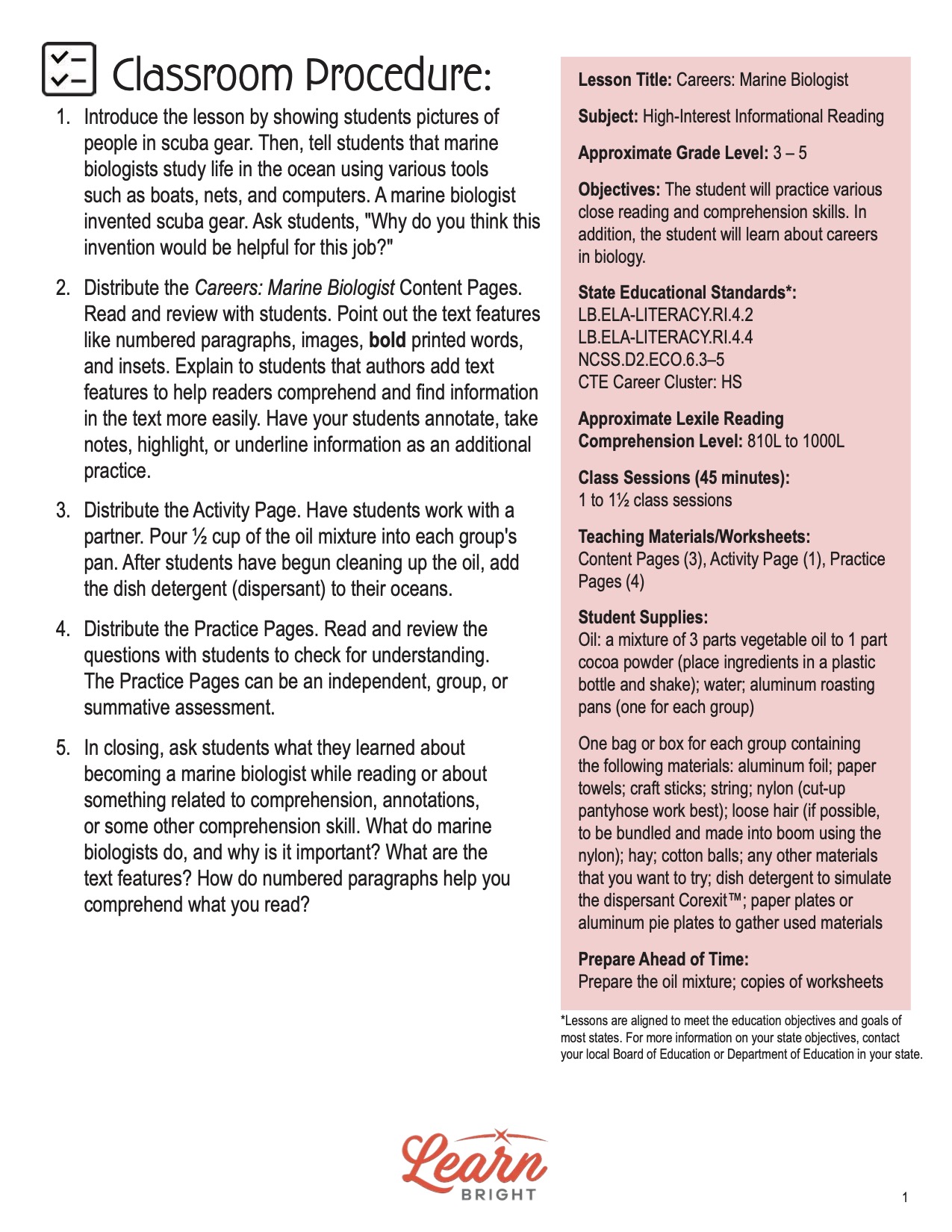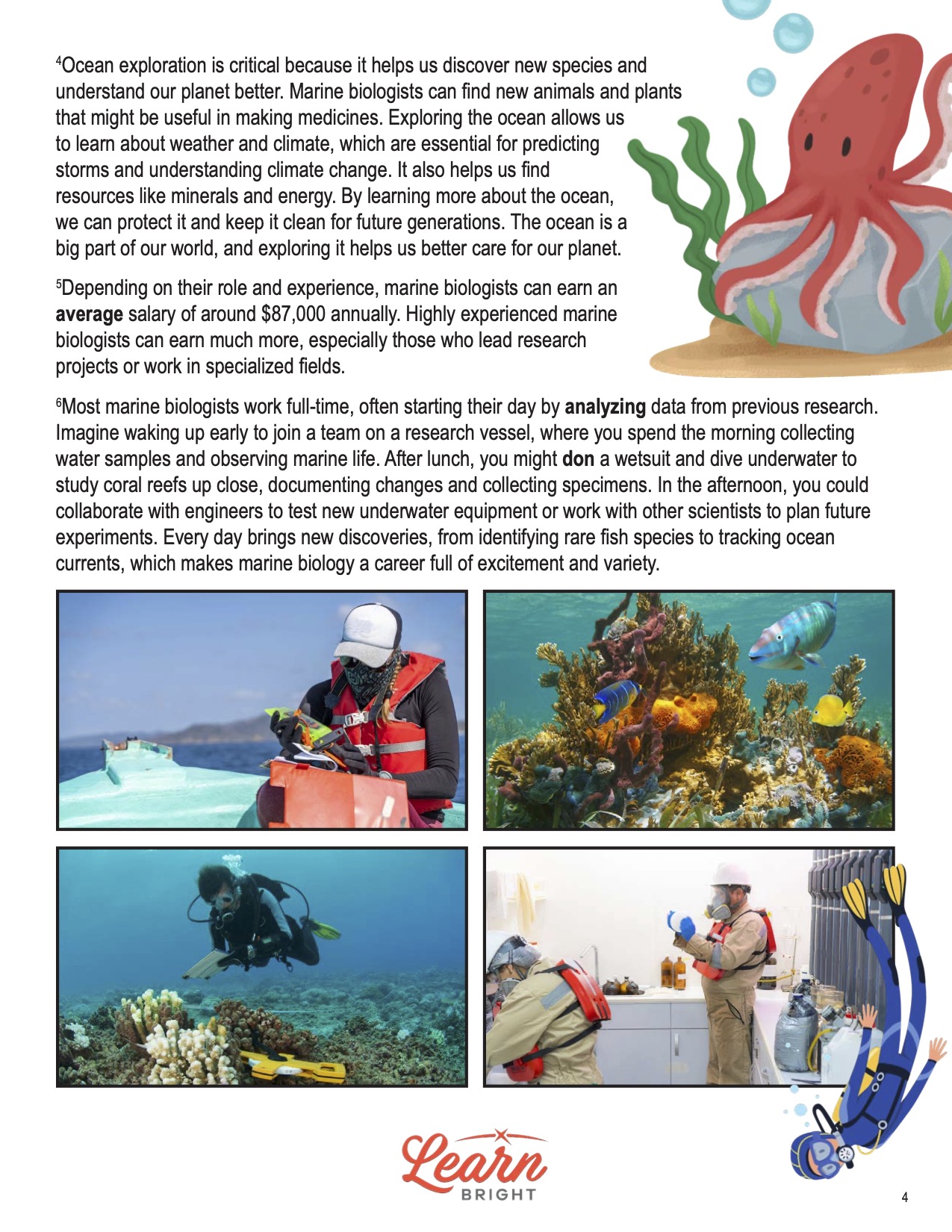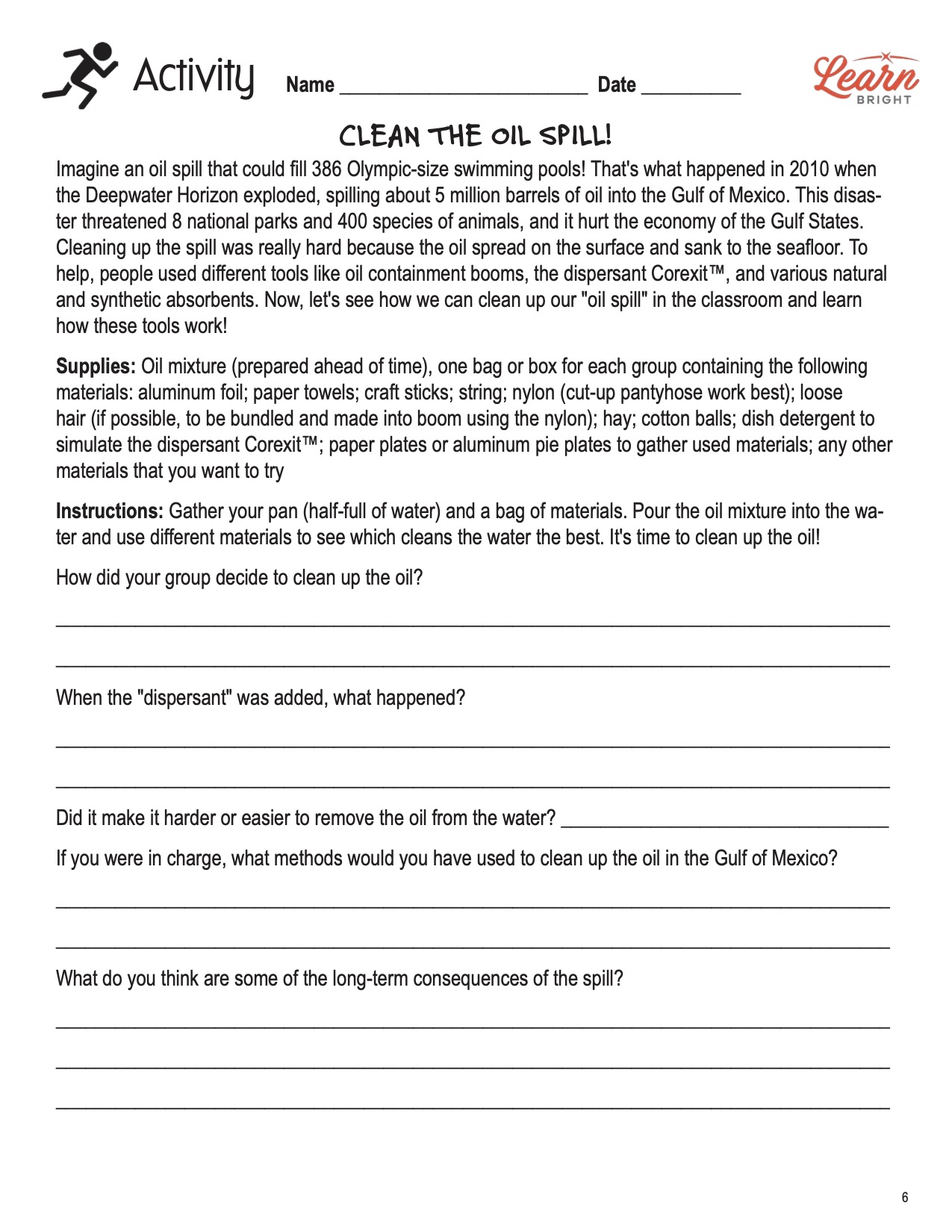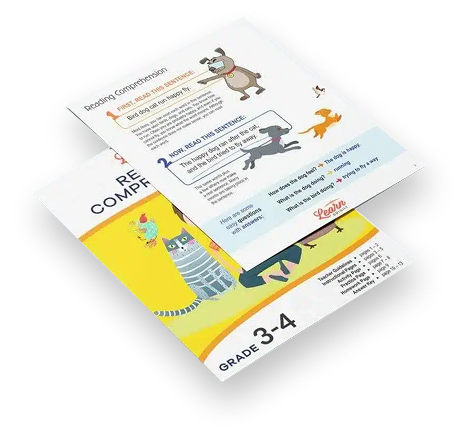Description
What our Careers: Marine Biologist lesson plan includes
Lesson Objectives and Overview: Careers: Marine Biologist is a high-interest reading comprehension lesson plan. As such, students will practice various close reading and comprehension skills. In addition, they will learn about careers in marine biology. This lesson is for students in 3rd grade, 4th grade, and 5th grade.
Classroom Procedure
Every lesson plan provides you with a classroom procedure page that outlines a step-by-step guide to follow. You do not have to follow the guide exactly. The guide helps you organize the lesson and details when to hand out worksheets. It also lists information in the yellow box that you might find useful. You will find the lesson objectives, state standards, and number of class sessions the lesson should take to complete in this area. In addition, it describes the supplies you will need as well as what and how you need to prepare beforehand. There is quite the list of supplies you’ll need for the activity for this lesson plan, so make sure you review this section. You’ll want to prepare the oil mixture ahead of time.
Teacher Notes
The paragraph on this page provides a little more information or guidance on what to expect from the lesson. It explains that you can teach this lesson in a whole-class setting or as an independent, small-group activity. You can use the blank lines to record any thoughts or ideas you have as you prepare.
CAREERS: MARINE BIOLOGIST LESSON PLAN CONTENT PAGES
Marine Biologists
The Careers: Marine Biologist lesson plan contains three content pages. It’s good to think about what you might want to do later in life and begin planning what you need to do now to be successful in the future. Why, you ask? After all, you’re just a kid! Well, it’s never too early to think about what you want to do when you’re not a kid. You will need to learn specific skills to do that work. What does a marine biologist do? And, if you want to be a marine biologist, what must you do to prepare?
If you have ever seen people scuba diving or working on research boats, then you have one idea of what a marine biologist does. A marine biologist is trained to study ocean life and ecosystems. They conduct scientific experiments, collect samples, and explore marine environments. The seafood industry, coral reef conservation, and understanding climate change all rely on marine research, which marine biologists help develop and maintain.
There are fewer than 100,000 marine biologists worldwide. Marine research requires highly specialized and skilled workers. Many organizations, including government agencies, universities, and private companies, employ marine biologists.
Logistics
Ocean exploration is critical because it helps us discover new species and understand our planet better. Marine biologists can find new animals and plants that might be useful in making medicines. Exploring the ocean allows us to learn about weather and climate, which are essential for predicting storms and understanding climate change. It also helps us find resources like minerals and energy. By learning more about the ocean, we can protect it and keep it clean for future generations. The ocean is a big part of our world, and exploring it helps us better care for our planet.
Depending on their role and experience, marine biologists can earn an average salary of around $87,000 annually. Highly experienced marine biologists can earn much more, especially those who lead research projects or work in specialized fields.
Most marine biologists work full-time, often starting their day by analyzing data from previous research. Imagine waking up early to join a team on a research vessel, where you spend the morning collecting water samples and observing marine life. After lunch, you might don a wetsuit and dive underwater to study coral reefs up close, documenting changes and collecting specimens. In the afternoon, you could collaborate with engineers to test new underwater equipment or work with other scientists to plan future experiments. Every day brings new discoveries, from identifying rare fish species to tracking ocean currents, which makes marine biology a career full of excitement and variety.
What Marine Biologists Do
Marine biologists use many cool tools in their work! They use nets and traps to catch fish and other sea creatures to study. Underwater cameras allow them to take pictures and videos of animals in their natural homes. With scuba gear, they can dive underwater to see coral reefs and fish up close. They also use microscopes to look at tiny sea animals and plants. Computers help them track and record all the amazing things they find.
Marine biologists work in many different places. They could work at universities and research centers where they study ocean life and teach students. Some marine biologists work for government agencies to help protect ocean environments. Others work at aquariums and marine parks, caring for sea animals and teaching people about the ocean. Marine biologists also spend time on boats and ships, exploring the sea and collecting samples. Sometimes, they travel to beaches and coral reefs to do their research.
Education and Training
In elementary or middle school, you must like science and math, possibly in a STEM program! The minimum requirement to become a marine biologist is a bachelor’s degree in marine biology, biological science, oceanography, or a related field. Many marine biologists have advanced degrees, and some specialize in areas like marine ecology or marine conservation.
In addition to their education, marine biologists undergo rigorous training. This includes scuba diving certification, field research techniques, technical skills training, and sometimes advanced courses in marine technology. You would learn to operate research equipment, conduct scientific experiments, and analyze data.
Marine biologists are essential to understanding the ocean and advancing marine science. They conduct vital research, help develop new technologies, and inspire people worldwide. A career as a marine biologist is gratifying. You get to sail through life doing something you are passionate about. That’s why you should consider a career as a marine biologist!
CAREERS: MARINE BIOLOGIST LESSON PLAN WORKSHEETS
The Careers: Marine Biologist lesson plan includes two worksheets: an activity worksheet and a practice worksheet. Each one will help students solidify their grasp of the material they learned throughout the lesson. You can refer to the classroom procedure guidelines to know when to hand out each worksheet.
CLEAN THE SPILL ACTIVITY WORKSHEET
For this activity, students will simulate an oil spill that they will have to clean up. Using the supplies you provide, they will try different methods to clean up the oil spill. When they finish the task, they will record some of their observations on the worksheet.
REVIEW PRACTICE WORKSHEET
The practice worksheet requires students to answer a series of 10 questions. These questions all relate to the content pages, so students will need to refer to them often for the answers. In addition, each question provides which reading tool the question corresponds to, such as text feature, vocabulary, or comprehension.
Worksheet Answer Keys
At the end of the lesson plan document is an answer key for the practice worksheet. The correct answers are all in red to make it easier for you to compare them with students’ responses. If you choose to administer the lesson pages to your students via PDF, you will need to save a new file that omits these pages. Otherwise, you can simply print out the applicable pages and keep these as reference for yourself when grading assignments.
